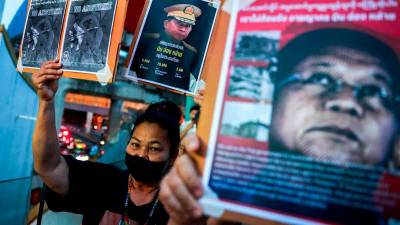
Myanmar hires US lobbyists for $3m yearly to mend US relations
WASHINGTON : A Washington lobbying firm has signed an agreement worth $3 million a year with Myanmar’s Ministry of Information to help the long-time military-ruled country rebuild relations with the United States. According to documents submitted under the U.S. Foreign Agents Registration Act (FARA), the DCI Group signed the agreement with the ministry on July 31, the day Myanmar’s military nominally transferred power to a civilian-led interim government ahead of a planned election. Myanmar’s leadership under military chief Min Aung Hlaing seized power in a 2021 coup and that year an Israeli-Canadian lobbyist they hired to represent them in Washington and other capitals said he had stopped his work because U.S. sanctions on the generals prevented him from being paid. The U.S. Treasury Department, the DCI Group, the U.S. State Department and Myanmar’s Washington embassy did not immediately respond to requests for comment when asked if U.S. sanctions would affect the agreement between the Myanmar ministry and the DCI Group. The formation of an interim government signals no change to the status quo in Myanmar, with Min Aung Hlaing holding on to all major levers of power as acting president while retaining his position as chief of the armed forces. He has appeared eager to engage with U.S. President Donald Trump’s administration after years of isolation. When Trump threatened new tariffs on Myanmar’s U.S.-bound exports this month as part of his global trade offensive, he did so in a signed letter addressed personally to Min Aung Hlaing. The general responded by lavishing praise on Trump for his “strong leadership” while asking for lower rates and the lifting of sanctions. He said he was ready to send a negotiating team to Washington, if needed. “TRADE, NATURAL RESOURCES” According to the FARA filing, the DCI Group “shall provide public affairs services to (the) client with respect to rebuilding relations between the Republic of the Union of Myanmar and the United States, with a focus on trade, natural resources, and humanitarian relief.” The filing was signed on August 1 by DCI managing partner Justin Peterson, who served in the previous Trump administration, and another managing partner, Brian McCabe. Reuters reported last year that the FBI has been investigating the DCI Group over its alleged role in a hack-and-leak operation that targeted hundreds of its client Exxon Mobil’s biggest critics. The DCI Group has said the allegations that it commissioned the hacking operation were false and that it directs all of its employees and consultants to comply with the law. In 2008, two top aides to then Republican presidential nominee John McCain resigned after work they did with the DCI Group for a previous military junta in Myanmar came to light. Jim Murphy, a former DCI president and managing partner, served as Trump’s national political director during his 2016 campaign. Myanmar’s state media reported on Thursday that Myint Swe, who became Myanmar’s president during the 2021 coup that saw the arrest of incumbent Win Myint and Nobel laureate and de facto leader Aung San Suu Kyi, had died in hospital earlier in the day. Myint Swe, a 74-year-old former general, was placed on medical leave in July last year, with his duties passed to Min Aung Hlaing. Engaging the junta would be a sharp departure for the United States, given U.S. sanctions on the military leaders and the violence committed against the Rohingya minority that Washington calls genocide and crimes against humanity. Last month, the Trump administration lifted sanctions designations on several junta allies, but U.S. officials said this did not indicate any broader shift in U.S. policy toward Myanmar and was unrelated to the general’s letter. Last week Reuters reported that the administration had heard competing proposals on ways to divert Myanmar’s vast supplies of rare earth minerals away from strategic rival China, although nothing had been decided upon amid major logistical and geopolitical obstacles. Securing supplies of so-called heavy rare earths, used in high-tech weaponry, is a major focus of the administration in its competition with China, which is responsible for nearly 90% of global processing capacity. - Reuters